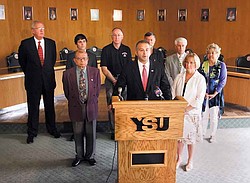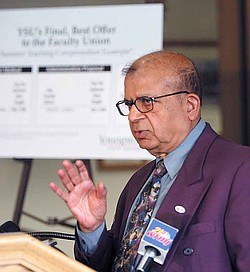YSU holds course
Scott Schulick, a YSU trustee, addresses the press Friday regarding negotiations with the faculty union. Trustees said they’ll listen to what the union has to say but won’t spend more than what’s contained in the last offer.
Dr. Sudershan Garg, chairman of Youngstown State University trustees, talks to the media during a news conference Friday in Tod Hall. Trustees said they stand behind the administration and the negotiating team.
Wendy Kosovec, left, of McDonald, and her daughter, Cassandra, wait Friday afternoon at YSU’s Office of Financial Aid and Scholarships. Cassandra, who will be a freshman studying early childhood education, came to check on the status of her financial aid.
Trustees say any new faculty proposal must not cost any more
By Denise Dick
Youngstown
Youngstown State University trustees say they’ll listen to what the faculty union has to say, but they won’t spend more than what the last, best contract offer entailed.
“The university just can’t afford to spend any more,” Sudershan Garg, chairman of the board of trustees, said at a news conference Friday.
The union representing YSU faculty voted Thursday to reject the university’s offer and announced that members would strike. A couple of hours after that announcement, the union changed course and called off the strike. The union said it wanted to return to the bargaining table.
Sherry Linkon, a faculty union spokeswoman, said that if the two sides can’t come to an agreement, the union can still strike. It would have to file a new 10-day strike notice with the State Employment Relations Board.
The strike that was to begin Friday was called off after leadership learned from other labor experts that they had more options: that they could be in their classrooms for the start of classes Monday, allowing students to get their financial aid, and go on strike later if an agreement isn’t reached.
Garg said that if the union can devise a proposal that wouldn’t cost YSU more, the trustees will consider it.
The university says it needs concessions to address a $1.7 million operating deficit this fiscal year.
The cost to the university of the proposed faculty contract would be about $700,000 based on the 2 percent pay increase offered in the third and final contract year.
The estimated savings to the university for the reduction in summer-school pay to faculty is $1.75 million over a three-year contract proposal.
The health-care reduction that the university is seeking for all university employees is $1 million the first year, $2.5 million the second year and $3 million the third, Ron Cole, university spokesman, said. Those cost estimates are based on a saved-in employee contribution of 10 percent, 12 percent and 15 percent in the first through third years respectively. The health-care savings the first year is lower because the increase won’t be effective until January, Cole said.
Linkon said members are disappointed that the board won’t consider more negotiations.
“We’re working hard to come to a compromise, and we’re sorry to see the administration is not acting in the same spirit,” she said.
Julia Gergits, president of the faculty union, said in a statement that she’s also sorry the administration isn’t willing to compromise.
“The administration and board of trustees have repeatedly claimed that we are creating problems in these negotiations,” she said. “But this afternoon’s statement makes clear that we are the problem solvers and they are creating obstacles to resolving this situation.”
A meeting between the two sides is set for Thursday.
In a statement, Stan Guzell, chief faculty union negotiator, said that “preconditioned discussions with an unwillingness to seek mutually agreed-upon solutions demonstrates a failure to fully understand and appreciate the bargaining process.”
Trustee Scott Schulick, chairman of trustees facility and finance committee, said it’s time to begin healing, to move on and to serve students and the community.
The economic crisis of 2008 has affected the university as well as the rest of the state and nation, and it’s something YSU will be dealing with for years, he said.
YSU saw a $7 million cut in its state subsidy this fiscal year and a $1.7 million operating deficit. The university also expects a 15 percent increase in employee health-care costs and is concerned about the student enrollment numbers for the fall semester, Schulick said.
Faculty members aren’t the only people on campus being asked to sacrifice, he said. The roughly 80 nonunion administrators took a pay freeze this year, and all employees on campus will be asked to make the same health-care contribution as the faculty members, Schulick said.
The average annual faculty salary is $72,213, and faculty members currently pay 1.5 percent of a monthly salary for the family health-care plan. Under the new proposal, that faculty member would contribute 10 percent in year one, and 12 percent and 15 percent in years two and three for health care. The percentage is higher for employees who earn more.
The university said that under the proposal, no executive administrator would pay less than what he or she is paying under the current system. President Cynthia E. Anderson will pay 35 percent of the premium share cost. Employees who earn less would pay a lower percentage.
Schulick said that Anderson’s salary, which Vindicator files show is $375,000 this year, is only a few thousand dollars more than what former President David Sweet earned with all of the allowances in his contract.
The salary was determined by trustees before a president was selected, he said. Anderson also has been very generous to the university, he said.
She donated $100,000 in her parents’ memory to establish student scholarships and an additional $25,000 this year for student initiatives, Schulick said.
While YSU grapples with contract issues, the Senate Bill 5 measure on the November ballot would reduce collective-bargaining rights of public employees. Linkon said that while SB 5 looms, it’s not the primary reason the union decided not to strike Friday.
“This shows why collective bargaining is so important,” Linkon said. Without collective bargaining, the university could impose whatever contract it wanted, she said. The measure also would make university professors nonunion employees.
Melissa Fazekas, a spokeswoman for We Are Ohio, the group urging people to oppose SB 5, said she couldn’t guess one way or another about how a YSU faculty strike might have affected the statewide effort.
“This shows that process does work,” Fazekas said. “They’re coming back to the table and continuing to work for what’s best for the students and the community.”
Connie Wehrkamp, a spokeswoman for Building a Better Ohio, the group that supports SB 5, said the union’s threat to strike demonstrates the problem that the measure would correct.
“These publicly funded professors and educators should educate students and not use them as a bargaining tactic,” she said.
Last week, the university notified students that financial aid and scholarship disbursements had been delayed because the union’s strike notice made the start date of classes uncertain. The university was told by a representative from the U.S. Department of Education to take that action.
Since classes are starting Monday, disbursement of financial aid can begin and students expecting an electronic refund may see funds deposited to their accounts beginning Monday.
For students expecting a check from the university, the checks will be distributed by hand rather than by mail, to allow students to have the checks in their hand more quickly. Students expecting a check from the university may pick up the check from 1 to 6 p.m. Monday or from 8 a.m. to noon Tuesday in the Ohio Room in Kilcawley Center. Any checks not picked up by noon Tuesday will be mailed that day.
 43
43



